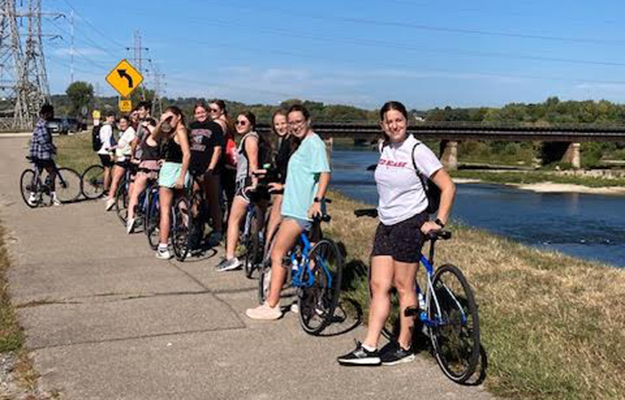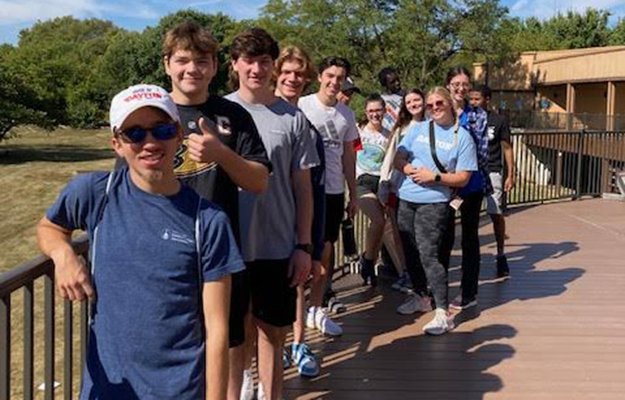Integrated Learning-Living Communities

Friday April 12, 2024
Business Ethics & Environmental Sustainability: SunWatch Archeological site bike ride
A bike trip in September 2023 to SunWatch Archeological site, west of the UD campus, across the Great Miami River, provided an opportunity to solidify the BEES’ (Business Ethics and Environmental Sustainability integrated living learning community) understanding of environmental sustainability by clarifying humanity’s early track record in the region.
- Ohio’s first prehistoric peoples — the Paleo Indians — were hunter-gatherers, and probably arrived in southern Ohio around 12,300 BCE, pursuing game, armed with fluted spears made of flint (suggesting an approach from the north where flint was abundant). They later retreated northward in the wake of the glaciers, but not before they hunted the local megafauna to extinction.
- Subsequently — around 8,000 BCE — the Archaic Indians arrived. They deployed a more sophisticated ‘killer app’ — a special spear, one assisted by atlatls. A simple stick with a hook on one end, permitting the projectile to be fitted and hurled with greater range and accuracy, enabling them to pursue the smaller, more elusive prey (deer, elk, bear, rabbit, wolf, raccoon and wild turkey) not hunted to extinction by the prior Native Americans.
- Subsequent groups — the Adena (early Woodland) and the Hopewell (Middle Woodland), supplanted the Archaic Indians — began to supplement hunting and gathering with farming and trade, perhaps humanity’s best innovation in terms of improving standards of living by providing greater scope for specialization and the division of labor. The decline of their civilization by 500 BCE was most likely due to climate change and resource exhaustion.
- The later Fort Ancient culture — arriving around 1200 CE — deploying yet another ‘killer app’: slash and burn farming. As the later bike trip to SunWatch revealed, the move from hunter-gatherer to farmer did detriment to human health (increasing infant mortality) as well as to the environment. SunWatch was abandoned just 20 years after its construction, apparently due to diminished soil fertility.
Despite the evidence that the ‘three sisters’ — corn, beans and squash — are not the health panacea as purported to be, the BEES feasted on the ‘local cuisine’ of the SunWatch people: corn (maize) tortilla chips, bean and corn salsas and sour patch kids (to remind everyone of the high rates of infant mortality inherent in the switch to from hunting and gathering to farming.

Share
Topics
